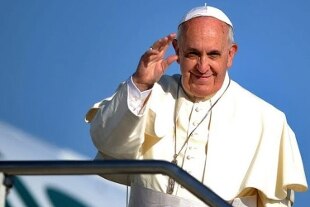Share
01 December 2021 There is great expectation among the Greek and Cypriot faithful for the arrival of Pope Francis.
The pontiff will be on a visit from 2 to 6 December first in Cyprus and then in Greece, two states bordered by the Mediterranean that have recently been the scene of geopolitical disputes with neighboring countries and the thorny and still unresolved issue of immigration.
"Comfort us in the faith" is the red thread of this new enterprise, a challenge of hope and dialogue, to awaken the souls and consciences of the rulers.
In the land of St. Barnabas and St. Paul - the latter the apostle of the peoples - and a bridge between East and West with an Orthodox majority, the journey will be marked by ecumenical and fraternal dialogue, for the care of the little flock and welcoming the least, immigrants, confirming the faith, comforting and encouraging local communities.
During the first stop in Cyprus, Pope Francis in particular will meet the Catholic community of the Latin-Maronite rite, made up of about 25,000 faithful, partly Christians of foreign origins. Relations with the Orthodox are good enough to the point that the current president of Cyprus will donate a plot of land for the construction of the first Nunciature right at the entrance to Nicosia, the European capital divided by a wall into two areas, the southern one, and the became the capital of the self-proclaimed government of the Turkish Republic of Northern Cyprus.
But the situation of Catholics in Northern Cyprus is not positive. About six thousand Maronites were expelled from their villages, lost not only geographically but also existentially, a place where no Catholic priests remained. Since 1974 the Turkish army has occupied 37% of the northern territory of the island, deploying more than 40,000 soldiers on the border.
This 35th international journey of Francis will therefore be marked by very broad themes, including the wound of divided Cyprus, whose hope of reunification will not be ignored by the Pope. Furthermore, the discovery of new gas and oil fields off the Cypriot coasts and strong economic ties it will have with Israel have become a cause for concern for Turkey which has made relations with the island even more strained. On Saturday 4 December Francesco will arrive in Greece; in Athens, the small community made up mainly of Byzantine Catholics, Ukrainian immigrants of the Eastern-Catholic rite, Chaldeans, Iraqis and Syrians, is already ready to welcome the bishop of Rome.
Greece has four dioceses of the Latin rite and two exarchats, Eastern and Byzantine, all linked to Rome. The ecumenical visit, under the banner of fraternity, will strengthen the strong bond between the Catholic and Orthodox Churches, based on a concrete and fraternal charity that puts itself at the service of one's neighbor. Then it is the peripheries that interest Francis; he will visit for the second time the refugee camp on the island of Lesbos, now collapsing and threatened every day by new arrivals. Extremely touching, will be the planned meeting with refugees and refugees from lands marked by conflicts in the Middle East. With a transversal message, which goes to Europe and the whole world, where the "walls" of indifference are still being built, the Pope invites us, after the pandemic, to walk all together, reminding us that "no one can be saved from alone".

